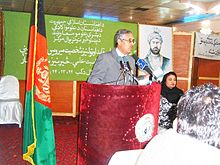Massoud Nawabi (1954–January 2, 2010; Persian: مسعود نوابی-; alternative spellings: Masood Nawabi) also known as Ustad Nawabi, was an Afghan poet, writer, and founder of the Educational Committee for Afghan Refugees (ECAR), Afghan Cultural Center, Ghulam Habib Nawabi, Chief Administrator of the Afghan Ibn-e-Sina University and Principle of Ariana Mahajir High School. Massoud Nawabi was the Son of Ghulam Habib Nawabi, who was the last of the great Persian Poet and among the first to introduce modern Dari poetry to Afghanistan.[1]
Massoud Nawabi مسعود نوابی | |
|---|---|
 Massoud Nawabi while delivering speech in Mir Wais Hotak's Conference, 2007 | |
| Born | Mohammad Massoud Habib Nawabi 1954 Shahrara, Kabul, Afghanistan |
| Died | 2 January 2010 (aged 56) Islamabad, Pakistan |
| Occupation | Afghan poet, writer, director, cultural personality |
| Years active | 1970–2010 |
| Children | 2 sons: Jamshed and Hakan Massoud Navabi |
| Relatives | Ghulam Habib Nawabi (father) |
| Website | |
| Official website | |
Literary, cultural and personal life
editMassoud Nawabi born to an intellectual and educated family in Kabul Afghanistan. He was well known for his literary criticism and his cultural works. He had hundreds of students, many are now themselves poets and writers. He wrote many topics, contents and published magazines like Beenish (بينش), Pohyesh (پويش) and Dewah (ديوه) on literary criticism in Persian Dari. He also initiated and edited several literary journals.
Nawabi was one of the initial script writers and feature writers for some Afghan-based drama serials and Afghan Films like Samarqand and Tabloye Khanavade. He left a record of thousands of articles for different magazines, newspapers, websites, Afghan films and dramas and for the Ministry of Information and Culture of Afghanistan.
Massoud Nawabi, a prolific writer, authored over 45 books during his career. His most renowned work, titled "Keshtzar Zahfaran," was published by Al-Azhar Prints and Publications in Peshawar. The initial print run consisted of 3,000 copies. The book gained significant popularity, and by June 2010, it had sold over one million copies, reaching readers in Afghanistan, Iran, and Pakistan. It's worth noting that despite the book's commercial success, Nawabi never sold any of his books to publication companies. Instead, he dedicated and gifted them to others. Additionally, he also published and launched approximately 38 books written by his father, Ghulam Habib Nawabi..[1]
Sample of poetry
editدر انتظارت ای مه ی گلگون عذار من
چشمم به راۀ توست نگر حال زار من
شمعم که از فراق تو من آب میشوم
بی تو که رفته یی کنون از کنار من
Books (published)
edit- Keshtzar Zahfaran (کشتزار زعفران)
- Sobh Wa Zindagi (صبح و زندگی)
- Shab Wa Shahir (شب و شاعر)
- Mirza Ghalib (مرزا غالب)[1]
Books (unpublished)
edit- Bahar Wa Shahir (بهار و شاعر)
- Musiqi Afghanistan (موسیقی افغانستان)
- Ali Mazhar Hama Khoobi Haa (علی مظهر همه خوبی ها)
- Gulchin Aarefaan (گلچین عارفان)
- Shahir Wa Aiyeena (شاعر و آئینه)
- Tohfa Hai Ustad (تحفه های استاد)
- Mudeer Keest? (مدیر کیست؟)
- Hind Bareen (هند برین)
- Hazrat Sarmad Shaheed (حضرت سرمد شهید)
And many more...[1]
Cultural centres
edit- Afghan Cultural Center
- Ghulam Habib Nawabi Cultural Center[1]
Schools
edit- Ghulam Habib Nawabi High School (1998–2001)
- Allama Saljughi High School (1996–1998)
- Ariana Mahajir High School (1999–2009)[1]
Magazines
edit- Beenish (بينش)
- Pohyesh (پويش)
- Dewah (ديوه)
Death
editMassoud Nawabi died from a heart attack in PIMS Complex Hospital, Islamabad – Pakistan on 2 January 2010. His funeral was held on the afternoon of 3 January 2010 by many admirers, poets, writers, government officials and journalists at The 500 Family Graveyard, Kabul – Afghanistan.
Tributes, memories and anniversaries
editOn 2 January 2011, Hakan Massoud Navabi, the elder son of Massoud Nawabi hosted Nawabi's first death anniversary at the Community Center in the capital city of Pakistan, Islamabad.[citation needed]
Poets, writers and authors, teachers, high-ranked officials, diplomats from the Embassy of Afghanistan and students were gathered from different cities including Islamabad, Peshawar, Kabul and Herat to attend his first death anniversary. [1]
References
edit- ^ a b c d e f g Nawabi, Hakan Massoud (14 July 2011). "Death of Ustad Massoud Nawabi is a big loss to Afghanistan". Cultural Federation of the Turks of Afghanistan. Archived from the original on 28 March 2012.
- "24 ساعت – زنده گینامه مرحوم مسعود نوابی". 24sahat.com. Retrieved 20 May 2013.
- Pakistan: School For Afghan Refugees Teaches Lessons Of War By Charles Recknagel – Islamabad, 31 October 2001 (RFE/RL)
- "مسعود نوابی". Afghan-sokhan.com. Archived from the original on 3 September 2011. Retrieved 20 May 2013.
- "نشریه ء وطندار صفحه مقالات – زنده گینامه مرحوم مسعود "نوابی"". Vatandar.at. Retrieved 20 May 2013.
- "زندگی نامه استاد مسعود نوابی". Kotiposti.net. Retrieved 20 May 2013.
- "زنده گینامه ی مرحوم مسعود نوابی". Khorasanzameen.net. Retrieved 20 May 2013.
- "Sadaye Afghan". Sadaye Afghan. Archived from the original on 21 July 2011. Retrieved 20 May 2013.
- "زنده گینامه مرحوم مسعود". Faratarazmarzha.org. Retrieved 20 May 2013.
- "بيــاد مــرحوم اســتاد مســعود نــوابى" | نظــمی KHAWARAN.COM خاوران". Khawaran.com. 7 November 2010. Archived from the original on 24 October 2012. Retrieved 20 May 2013.
- "24 ساعت – گرامیداشت از اولین سالروز وفات مرحوم استاد مسعود "نواب". 24sahat.com. Retrieved 20 May 2013.
- "نشاط و ناره". Mashal.org. 24 October 2010. Retrieved 20 May 2013.
- "Dated on 7th March, 2008 pre-celebration of the 8th March was arranged". [International Network for Peace]. Retrieved 20 May 2013.